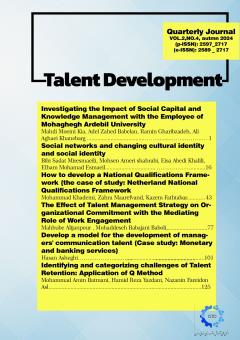بررسی تاثیر بین سرمایه اجتماعی و مدیریت دانش با بهره وری کارکنان دانشگاه محقق اردبیلی
الموضوعات : New theories and models of human resource training and development
مهدی معینی کیا
1
,
عادل زاهدبابلان
2
,
رامین غریب زاده
3
![]() ,
علی آقایی خانه برق
4
,
علی آقایی خانه برق
4
1 - دانشگاه محقق اردبیلی
2 - دانشگاه محقق اردبیلی
3 - دانشگاه محقق اردبیلی
4 - دانشگاه محقق اردبیلی
الکلمات المفتاحية: سرمایه اجتماعی, مدیریت دانش, بهروری کارکنان.دانشگاه محقق اردبیلی.,
ملخص المقالة :
هدف اصلی این پژوهش بررسی تاثیر بین سرمایه اجتماعی و مدیریت دانش با بهره وری کارکنان دانشگاه محقق اردبیلی می باشد. جامعه آماری مورد مطالعه این پژوهش کلیه اعضای کارکنان دانشگاه محقق اردبیلی بوده که در سال تحصیلی 1396-1395 در خدمت دانشگاه بودند که از بین آنان230 نفر به عنوان نمونه آماری پژوهش و با روش نمونه گیری تصادفی ساده انتخاب شدند. روش تحقیق در این پژوهش، توصیفی-همبستگی با استفاده از مدل معادلات ساختاری می باشد. برای گردآوری اطلاعات از پرسشنامه های سرمایه اجتماعی ناهاپیت و گوشال و مدیریت دانش نوناکوتاکاچی و بهره وری کارکنان اچیو استفاده شد. ضرایب پایایی این پرسشنامه ها با استفاده از روش آلفای کرونباخ به ترتیب سرمایه اجتماعی81 /.، مدیریت دانش،87/.، بهره-وری 84/. به دست آمد. داده های تحقیق پس از جمع آوری بر اساس فرضیه های پژوهش و با استفاده از روش تجزیه و تحلیل با استفاده از نرم افزار لیزرل و مدل معادلات ساختاری بوده است. نتایج پژوهش حاضر نشان داد که بین سرمایه اجتماعی و مدیریت دانش با بهره وری کارکنان داشگاه تاثیر معناداری وجود دارد. لذا لازم است تا دانشگاه ها در زمینه تشویق و تشکیل گروه ها و انجمن های حرفه ای و تخصصی که موجب هویت مشترک بین آنان و افزایش سرمایه اجتماعی و بالطبع موجب بهره وری بیشتر کارکنان دانشگاه می گردد تلاش کنند. همنین آموزش یکی از مهم ترین فراگردهای موجود در افراد، گروه ها و موسسات و سازمان ها برای ایجاد سرمایه اجتماعی، فرایندهای اموزشی است.
1. Ramfel, M. (2002). Knowledge-Based Societies New Challenges for Higher Education, translated by Marzieh Mokhtaripour and Mostafa Emadzadeh. Isfahan: Jihad University Press, Isfahan Branch, 2008.
2. Dostar, M; Ebrahimpour, M; Hashemi, S. The effect of social capital on the development of knowledge management in universities affiliated to the Ministry of Science, Research and Technology of Guilan province, management improvement. (1391), 3 (6), 31-5.
3. Brooks, K & Natukho, F. Human Resource Development. Social Capital, Emotional Intelligence: Any Link to Productivity Journal of European Industrial training. (2006). 20(2), 117-128.
4. Lesser, E.L. Leveraging social capital in organizations, in Lesser, E.L. (Ed.), Knowledge and Social Capital: Foundations and Applications, Butterworth-Heinemann, Burlington, (2000). 3-16.
5. Mehr Alizadeh, Y. New theories of management (theoretical and empirical foundations), Ahvaz Chamran University Press, first edition, (2009), p.31.
6. Radfer, R; Rezaei Malek, N; Rezai Malek, M. Evaluating the improvement of the organization's financial operators by implementing the knowledge management system, Journal of Management Accounting, (2014), 7 (21), 33-46.
7. Akhavan, P. Bagheri, R. Knowledge management from idea to action, second edition, Tehran, Ati Negar Publications, 2011.
8. Taheri, Shahnam. Productivity and its analysis in organizations (inclusive productivity management), 26th edition, Tehran, Hestan Publications, 2017.
9. Danieli Deh Houz, M. Allameh, S. Mansouri, H. Investigating and recognizing the factors affecting the productivity of human resources and determining their priorities among the staff of the Islamic Azad University, Izeh Branch. Productivity Management, 2013; 7 (4 (27) Winter): 51-80.
10. Ali Akbari, F. Productivity Issues, Kayson Quarterly, No. 4, 2009.
11. Nazim, F. Motalebi, A. Presenting a structural model of intellectual capital based on organizational learning in Shahid Beheshti University. Journal of New Approach in Educational Management, 2011; 2 (5): 29-50.
12. Shaimi Barzaki, A. Indicators for measuring knowledge and intellectual capital management, 3rd International Management Conference, Tehran, 2005, p.
13. Nikpour, A. Salajege, S. Investigating the relationship between knowledge management and organizational culture from the perspective of faculty members of Kerman University of Medical Sciences, beyond management. 1389, 4 (14) 18-7.
14. Mohayidin, M [et al]. The application of knowledge management in enhancing the performance of Malaysian Universities. Electronic Journal, 2007, 3(6), 52-63.
15. Moghli, A. Bahmanyari, H. Daneshvar, B. Masoumi, R. Investigating the relationship between social capital and knowledge management in Shiraz University of Medical Sciences. University of E-Learning (Media), 2005, 2. 40-51.
16. Gurchian, N. Bahmanyari, H. Daneshvar, B. Masoumi, R. Study of knowledge management in the higher education system and provide an appropriate model. Management Futures Research, 2006; 18 (No. 2 (consecutive 69)): 13-19.
17. Amrayi, F and Reshadatjoo, H and Masoudi A, Yerevan and Chegni, T. Relationship between knowledge management and human resource efficiency of general hospitals of Lorestan University of Medical Sciences, 8th National Conference and 2nd International Conference on Knowledge Management, Tehran, 2005, https://civilica.com/doc/532743
18. Alwani, S; Nategh, T and Farahi M. The role of social capital in the development of organizational knowledge management. Iranian Journal of Management Sciences, 2007; 2 (No. 5): 35-70.
19. Chow, W.S. and Chan L.S. Social network, social trust and shared goals in organizational knowledge sharing. Information & Management, 2008, 45(7), 458–465.
20. Tymon, W.G & Stumpf, S.A. Social Capital in the success of Knowledge workers, 2003.
21. Ahmadi Taheri, M; Qelich Lee, B and Hatami, A. The effect of organizational social capital on knowledge sharing in the studied media organizations: New Media Center of the Radio and Television Organization, Education and Human Resources Development, 2016, third year, No. 10, 21-1.
22. Haw, I. M., Hu, B., Lee, J. J. & Wu, H. Investor Protection and Price Informativeness About Future Earnings: International Evidence. Review of Accounting Studies, 2012, 17 (2), 389-419.
23. Hoffman, J ; Hoelscher, M. L & Sherif, K. Social capital, knowledge management and sustained superior performance. Journal of Knowledge Management, 2005, 9(3), 93-100.
24. Behrangi, M. Yousefi, A. Focal correlation analysis of the relationship between the dimensions of philosophical mentality and contingent leadership style of managers. Applied Educational Leadership, 1399; 1 (1): 1-14.


